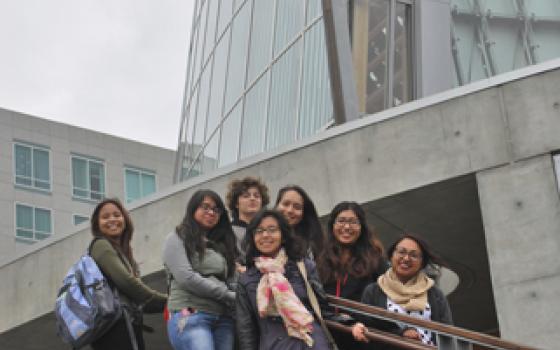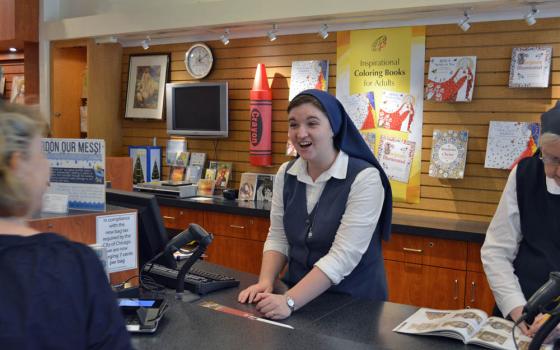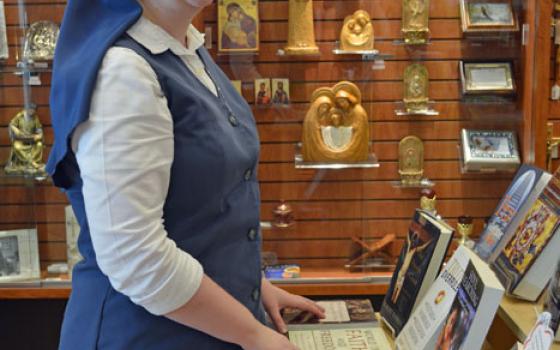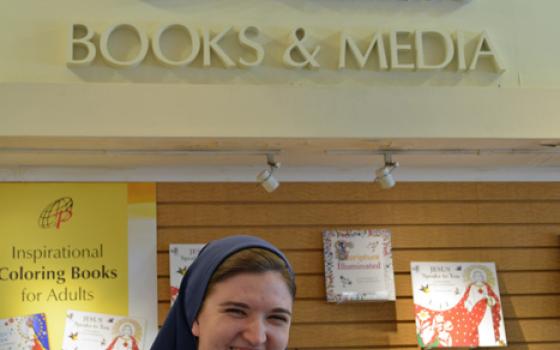At 26, Sr. Chelsea Bethany Davis says she is the youngest professed sister of the Daughters of St. Paul in the United States.
Davis, who is about four years from professing her final vows, talked to Global Sisters Report at her home, above the Pauline Books and Media store on Chicago's bustling Michigan Avenue, about life as a millennial sister at a time when a significant majority (around 90 percent) of American women religious are above the age of 60.
Davis was 13 when she first encountered religious sisters in full habit, and that marked the beginning of her vocation to religious life.
Davis: I was so inspired by their joy and the fact that you could tell they were deeply happy people. That was something that I wanted. I saw that the happiness stemmed from a love of the Lord and a love for helping other people.
GSR: And you encountered the nuns where?
Because I was homeschooled, we belonged to a homeschooling group. I was in middle school, and this mom set up a class about religious vocations. So different sisters and different priests came in.
A study called "We Are Sisters" that came out at the end of 2015 shows a significant number of the women who enter religious life are highly educated. They've got degrees and they've had quite a bit of life experience. And there you were at 13, 14, thinking about this. How did you arrive at it without the kind of maturity that women with multiple degrees have had?
When I finished that set of classes, we got a little magazine, and it had different religious orders in it. When I was looking through it, the one that caught my eye was the Daughters of St. Paul. It was about how our sisters work in the media and how our sisters communicate the Gospel using the media. Even at 13 or 14 years old, that was really intriguing to me. These sisters wanted to be where I was.
I wrote this little letter to the Daughters of St. Paul and a few other communities that I thought looked interesting because I liked teaching. I liked children. I thought I could see myself working with the elderly, maybe.
Everybody else wrote back and said, "That's really sweet that you're 14. You're really cute. Write us back when you are 16 or 18, when you have a little life experience." But the Daughters of St. Paul wrote back and said, "We have a summer program happening in July, do you want to come?" And I was like, "Uh, yes!"
My parents let me get on a plane and fly to Boston, where the Daughters of St. Paul motherhouse is, and I visited for the first time. I think that was really key in my discernment because I got to see the sisters in real life and real time, praying and living life, and experience their life for five days. I didn't need a big degree to understand that I feel at home here. Or I didn't need life experience or a degree to feel like these are my sisters. I feel like these people are my family.
When I went back every year, I felt the same thing. Certainly, there were times in high school when I was like, "Thanks but no thanks, God! I don't really want to be a sister, so you can stop playing with my heart!" But every time I visited the sisters, I felt so much peace, and I felt so at home. You don't need a whole lot of degrees or life experience to know that. There's not really a way to explain it other than you just know.
Let's talk about the fact that being a young nun is considered radical.
It definitely is a radical lifestyle. I was 20 years old when I entered the convent. People always told me, "That's so insane. How could you do that? How could you give that all up?"
The other part of me didn't realize it was too much of a hardship at the moment that I entered. I've discovered it more as I've gotten older. I'm glad that the Lord doesn't let me experience it all at once because I think I'd be a mess.
There are times when you're like, "I'm never going to have my own children. I'm never going to carry a life within me." But I get to experience spiritual motherhood, which is beautiful.
"I'm never going to have a career or climb the career ladder." But that's not important to me.
"I'm never going to have my own life schedule or my own apartment that I get to decorate how I want." But I get to share my life with my sisters.
It's things like that that make it radical. But it is something that I continually have to say yes to, and it is a radical yes. I say yes to everything that the world doesn't find important. I'm saying no to the things that the world finds to be of great importance.
What about the fact there's a big generational difference between you and your sisters?
While our community is blessed with sisters aged in every decade, our sisters are older than me, definitely. I'm living with people who could be my great-aunts.
The age difference between one of the sisters in my community here in Chicago and myself is 50 years. That's a big difference, but it makes me a better person because I get to see her wisdom and her life experience, and it stretches me and helps me to grow. And I would hope in the same respect, she living with a mid-20-year-old is something that helps her to stretch and grow. The other day, I was explaining what a gif is on Twitter. She gets to learn things like that, and I get to hear about things that happened 40 years ago, before I was born.
For a lot of women now, just to have a high school diploma is not enough, not just for religious, but in general. It used to be a college degree was the norm; now, a master's degree is the norm. So a lot of women aren't even looking at vocations and things until college or even their master's. That's when they're like, "Oh, wait. I should actually maybe consider something," like being open to what the Lord is asking.
Before, young women were looking at, "OK, will I get married? Is religious life for me?" They were looking at that when they were 18 or 19. Now, you're not looking at a career choice until you're 23 or 24. So everything has moved up.
What would you tell people your age about religious life?
I think a lot of people come with this notion that it's almost like an escape, like you're running away from something. Or that religious life is boring.
I think it was St. Pope John Paul II that said, "Life with Christ is always an adventure." And that's true. That's something that I've always experienced.
Especially as a millennial, as a person who is younger, the world always tells us, "It's what you want. It's how you feel." OK, as a person, your feelings are valid, and all that. But do not be afraid to ask the Lord what he wants. Because whatever it is, he is going to call you to happiness.
Whenever I give vocation talks, I say, "If he's calling you to religious life, you are going to be deeply happy. I promise you that. If he's calling you to marriage, you are going to be deeply happy. I promise." It's not a skipping-down-the-halls happiness every day, but if God has created you for something, he's going to bring you the utmost joy, and that's what going to make you holy.
What is your specific ministry?
Our ministry is really to communicate that Gospel through media. I get to tweet people, Snapchat things, Instagram things, write a book about it or write a blog post about anything related.
My specific ministry here in Chicago is evangelization and outreach. We have a bookstore on Michigan Avenue. So my specific ministry right now is to take our books and media and religious articles and bring them out to parishes and schools, people who wouldn't necessarily make it all the way downtown. I get to bring it out to them or speak at Masses or events or schools, and I get to be that witness. The other thing is, I'm our local vocational director here.
At your age?
When they asked, I was like, "Really, me?" They asked somebody else, and they were like, "I don't think I can do it." So they asked me. It gets assigned at our first profession of vows. And a lot of it is based on need.
If we have somebody who would come to the Chicago community, I would work with them to see, "OK, is this really where the Lord is calling you?" Or sometimes, a woman will visit once, and we'll talk a little bit and the woman will realize maybe this is not for her. Each house has a local vocation director to filter them through, so our national vocation director isn't totally swamped all the time.
It's clear what moves you about religious life. What challenges you about it?
I always say the best and the most challenging thing about religious life is community life. You don't get to choose your sisters, but God chooses who you get to live with. That's a challenge because it's not like if you were married, you choose the person that you live with. We do step on each other's toes. Maybe our personalities don't always click. But that's also the beauty of it because we get to help each other grow. I would never have chosen to live with this person, but she's making me a holier person.
It's definitely a challenge, but it could also be the most beautiful part, if you let it. The vows are a challenge, but they're meant to be a challenge. They are a challenging invitation to live sometimes.
How so?
We live in poverty, so I don't have my own bank account. I like shoes. So if I see a pair of shoes I'm like, "Oh, those are so cute." I can't just buy them because I don't have any money. And my superior will ask me, "Do you need a pair of shoes?" If I say yes, she will let me get them. But if I don't honestly need a pair of shoes, I can't get them. It's definitely a challenge to learn to love each of the vows.
Are you OK with the habit?
I'm glad that we wear something that people recognize us as Catholic sisters. That was something that was important to me discerning, is there a distinctive habit? To me, that's part of the witness.
Even if I don't get to talk to people, let's say (my family is) going into Target, or we're going to lunch with Grandma. All the people in the restaurant, all the people at Target, I don't get to talk to all of them, but when they see me, they get to think about God, whether they like it or not. That was important to me, to be able to be a visible witness, because if I'm going to give my whole life to this, it's all or nothing!
Here in Chicago, it's the coolest thing because we walk to Mass every day, five blocks to St. Peter's downtown. And every block, you get one or two people: "Good morning, Sister. Hi, Sister. How ya doin', Sister?"
I really try not to be on my phone when I'm walking to and from Mass because I get to smile at people, and they get to see me. It's 7 in the morning, so people are still waking up with their coffee. Hopefully they have Jesus for the rest of their day with a smile from Sister.
[Simone Orendain is a freelance multimedia journalist who reports from the Chicago/Midwest area and Asia.]



